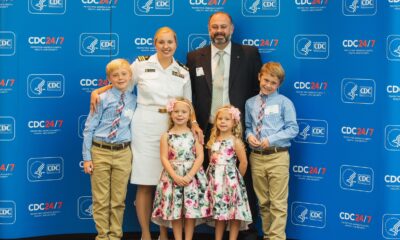Education
Wesleyan School’s 25 Years in Peachtree Corners [Podcast]
Published
4 years agoon
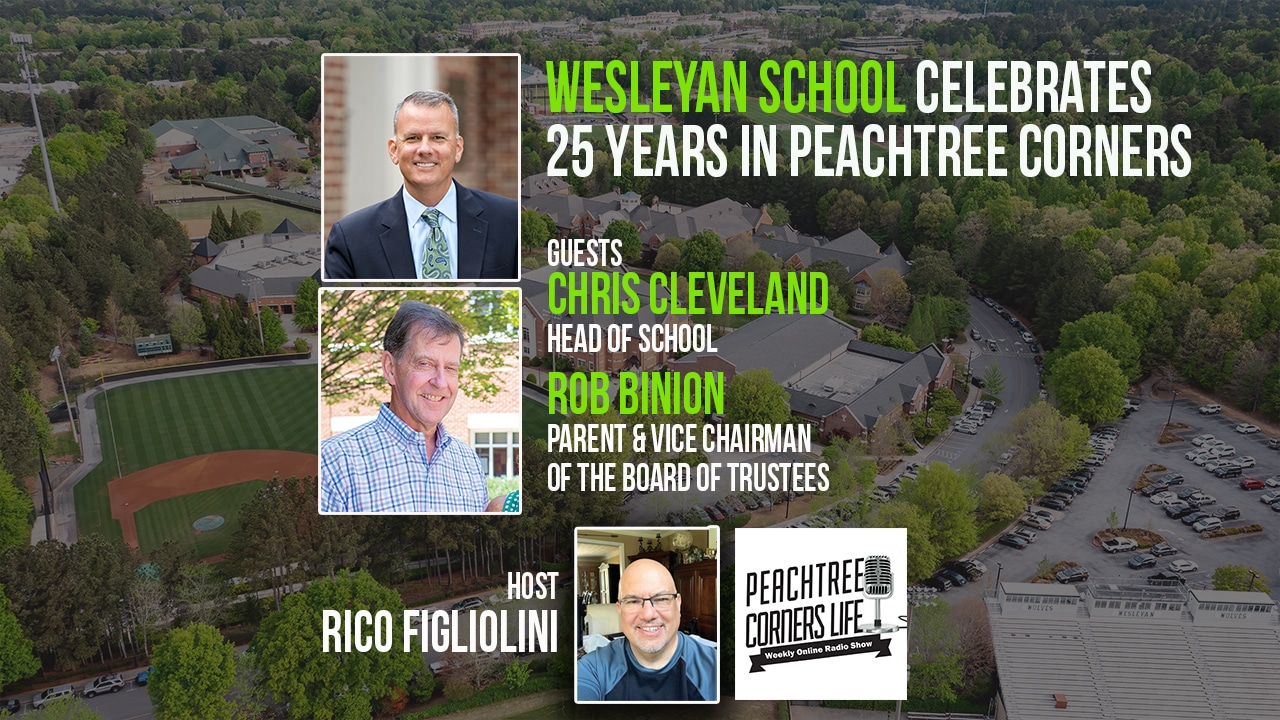
Wesleyan School has been a huge facet in the community of Peachtree Corners for more than twenty years. On this episode of Peachtree Corners Life, Rico is joined by Chris Cleveland, Head of School at Wesleyan School, and Rob Binion, Vice Chairman of the Board of Trustees. Listen in, as they discuss the history of Wesleyan, how it became such an important part of Peachtree Corners, and the exciting future of this amazing school.
Resources:
Website: https://www.wesleyanschool.org
“Our goal is to continue to attract families to the school, to attract families, to Peachtree Corners. And you do that by not standing still. You do that by pushing yourself and asking yourself the question, how can we make the school experience better so we draw more families. And for us, our mission it’s so more families can be exposed to the gospel and to learn more about their faith. And in the process we believe they’re going to get a great education and be a part of a community that extends beyond our campus.”
Chris Cleveland, Head of School
Podcast Transcript:
[00:00:30] Rico: Hi everyone. This is Rico Figliolini host of the Peachtree Corners Life. I want to welcome you all here today. Today’s special show follow-up to a feature story we had in Peachtree Corners Magazine in the latest issue, about the 25th anniversary of Wesleyan school here in Peachtree Corners. And today we have two guests, the Head of School Chris Cleveland and Rob Binion, who’s been an evergreen. Well, he says the kids have been evergreen. He’s been with the school for over 25 years, I believe going on 26 years. So let me, bring them on. And they’re you guys. Good morning, how are you?
[00:01:03] Chris: Morning.
[00:01:03] Rob: Good morning.
[00:01:03] Rico: So Chris is on my right, and Rob Binion’s on my left. Chris has been head of schools probably, how long has it been now? 20 years, I think?
[00:01:12] Chris: No, this is my 20th year as an employee of Wesleyan school. It’s my eighth year as head of school.
[00:01:19] Rico: The head of school. Okay, cool. And then Rob Binion is not only a parent with three kids that have gone through school. I think all of them are out now if I understand correctly.
[00:01:29] Rob: Correct.
[00:01:29] Rico: But you also on the, you’re vice chairman currently on the board of trustees as well at the school.
[00:01:35] Rob: Correct? I’ve served on the board since 1995.
[00:01:39] Rico: Wow.
[00:01:39] Rob: And served as the chairman for about 20 years.
[00:01:42] Rico: Wow. It’s interesting history you all have. Because you started out, like many schools along this line to some degree started out as part of a church based school. And then grew out from there. So Wesleyan, most people may not know is pretty much a college preparatory, private college preparatory school. A non-denominational Christian school, christian values of course. And close to 1200 students now. I think when you guys first moved to Peachtree Corners and took over the original plot of land, whatever that was 56 plus acres I guess at the time, you were maybe a little over 500 students when you guys moved to Peachtree Corners. So who wants to start off telling us a little bit about that history? About the beginnings of that? Would it be Chris or would it be Rob?
[00:02:27] Chris: Rob was there to live it personally. I just know of it through hearing the story told, so I’ll let Rob go first.
[00:02:35] Rico: Okay.
[00:02:36] Rob: So we were in Sandy Springs, founded by Sandy Springs United Methodist Church. There was a shortage of desks and Christian schools back then, especially at the high school level. So when my wife, Cathy and I enrolled our first child in 1990, Wesleyan was a K through eight school. Or a preschool through grade school. And the conversation you immediately heard, and it was chatter everyday, all day about the expansion of Wesleyan into a high school. So as early as 1990, there were efforts to, along with the church to find land, expand the school somewhere in the Sandy Springs, North Buckhead area. And so those efforts proceeded along slowly and very frustrating because it was, as it would be now, it’s just very difficult to find a large enough plot of land to do that. And also there was, as you can imagine, there were amiable conflicts with the church. It means things as simple as parking spaces and telephone lines and who uses the gym on what night. So there was all sorts of reasons why Wesleyan needed to grow and expand. And hence the ventral location of the, at that time, 52 acres of land in Peachtree Corners. That happened in a very providential way with relationships coming together, including myself and Dan Cowart, who kind of met for the first time in 1995 and started discussing that piece of land as a place for Wesleyan to relocate. So that, that was the beginning of a church that needed to expand its school. And then a group of parents and educators that finally found a piece of land to do that.
[00:04:11] Rico: It’s interesting because most schools of this nature usually expand close by to the church that they’re growing out of, but you all decided to at the time. I moved here in 95, so in 95, there was not as much density if you will, as there is now. So you chose to move to Peachtree Corners. Far enough away from Sandy Springs, that that must have been a challenging subject. Because I’m sure there are students that were going there at the time where parents thought Sandy Springs would be a great place for that. So how did you attend to that?
[00:04:42] Rob: It was a huge challenge. The goal and the plan of the board was to stay as close to the current or Sandy Springs United Methodist church as we could. But things happened with educators that were helping us grow. And Dan Cowart was talking to other consultants about a new school and a new high school that finally convinced the board that they needed to move 10 miles away. But then presenting that to a parent body of about 500 at the time in Sandy Springs was contentious to say the least. But honestly, I was telling this to somebody the other day, there were parents who said, I’m not bringing my child from Buckhead to Peachtree Corners, but I will help you. I’ll volunteer my time. I’ll give you money. So they were convinced after the evidence was presented that this was the best site for Wesleyan to go to. Again, providential relationships. The site was zoned. That’s very hard to find, even though there was no buildings on it, there were utilities in place and the road in place. Just very unusual, positive circumstances that told the entire community that this was the right thing to do and God was pushing us in that direction.
[00:05:57] Rico: I mean, it’s certainly fortunate, Dan Cowart and the Cowart family were doing development here in Peachtree Corners. Building Technology Park and building homes. And it almost, I get the chills a little bit, because it’s almost like it all did fall together correctly. Great public school system, having a great private school coming here that was already established versus having to build up from it. So just a lot of good things and enough land, it seems for you guys to really expand on. And I think your land area now is actually 86 acres in Peachtree Corners.
[00:06:33] Rob: Yeah, we’ve grown from the original 52 to 86. And that was some vacant land and some houses and some other commercial buildings that we’ve acquired along the way.
[00:06:41] Rico: And phenomenal. You guys are just continuing to expand. Even now you’re expanding. I think the, if I remember correctly, you added in an athletic or you’ve shifted athletic fields. So that you can have a building now, the stem building. I think if that’s right, coming up. So just a lot of good movement there. So once you had parents on board and you were able to close the deal for the land, there was nothing here, right? It’s not like you took, repurposed the building. So how’d that work out?
[00:07:11] Chris: I’ll take a swing at that one Rico. You’re right, we had land, which was great that it solved one of our big problems. And as Rob so eloquently put it, that was not an easy proposition for the families who had been at Wesleyan Day School as it was called in Sandy Springs. And at the time Atlanta was a much different place in terms of traffic and geography 25 years ago. But to move 10 miles away from our, what had been our home was not a small thing. And so once we got that land, then we had to figure out the next set of challenges. You’re right, this land was completely undeveloped. There was nothing but woods and mud and red clay here.
[00:07:55] Rico: I’m going to put that picture back on as you’re speaking.
[00:07:56] Chris: Yeah. It was originally an extension of Technology Park and that’s where Dan Cowart had purchased the land. As you can see in this picture, we had a road and we had a pond. You can see a little bit of early site plan clearing of land in the upper left-hand corner of the picture that you’re showing right now. And that’s where we would begin to scratch out a campus. So we brought out 15 trailers. We didn’t call them trailers, of course. We called them modular educational units because we think that sounds better to people when we’re trying to convince them to send their children to school at Wesleyan. We started construction on our first building, which would be Marchman Gym. In the picture you’re showing now, you can see in the upper right-hand corner, the trailers as they were assembled. Marchman Gym is the structure that’s at the top center of the photo. That was our all purpose building. It had a stage at one end. It’s where we had chapel, it’s where we had plays and performances and the arts. It’s where we did assemblies, where we hosted parents night. It was the only building we had on campus where we could fit everyone. And so that spring and summer of 1996 was spent getting those trailers positioned and anchored down and building Marchman Gym. But it’s interesting that at the same time we were doing that, we were trying to get families to apply to the school. We really didn’t even have a school to let them tour. And we were trying to hire employees to work at this place and we couldn’t even show them what their classroom would look like. And so it was quite a scramble from January of 96 until labor day of 1996, just to get to a point where we could open the doors and have classrooms and bring children in. And that was a busy time, but a really encouraging time in the history of the school to see people rally around this vision and this idea of what Wesleyan could become one day. But to be a part of it from the ground floor, and we liked to call those people pioneer families. Rob and his family were a pioneer family. Not only as parents and students, but Rob is a member of the board of trustees. And it was a lot of flying by the seat of our pants. A lot of praying and a lot of trusting God that he would show up and fill in the blanks for us because there was probably a lot more blanks than there were answers in those early days.
[00:10:29] Rico: And at the time even you hired, or the board hired, the first headmaster of the school that’s in Peachtree Corners and that was a Zack Young. Graduated University of Virginia and Harvard University. And he was a master fundraiser, if I understand correctly. Did that come together? I guess that came together well, because when you have a building program, you have to have a fundraiser. So how beneficial was that to be able to have someone that was and had experienced in doing that?
[00:10:58] Chris: Yeah. Rob lived through that, so I’m going to let him talk about that.
[00:11:03] Rob: And that’s another miracle. I mean, the idea that Zach Young, who was born and raised in Buckhead, went to school himself at Westminster. Honestly, when we first talked to him, he had very little idea where Peachtree Corners was. It was outside of the perimeters of all he knew. He didn’t really understand the idea that that community would commit and support an independent Christian school. So he had to be convinced of that, but God was the only one that could convince him of that. We tried, and then he and his wife walked the site one Sunday afternoon and were just convinced that God was calling them there to help build the school. And so we, the board and most people that start some kind of enterprises, always think about banks and debt as the way to get going And one of our first meetings with Zach, when we first started talking to him in October, November of 1995, was that no. Debt will not build and sustain a school. So we need to start raising money now, which was his background. He knew how to do it. He knew where to do it and who to talk to. He was the connection, but he also had a heart and a mind for Christian education and hiring the right people to put in place to build the school and build the curriculum and build the Christian programs that are now part of our legacy. So Zack was the miracle of the personnel. And now we’re 200 strong and there are people that are all really descendants of Zach and his idea from the beginning. So he did help us push it to the next level.
[00:12:44] Rico: Amazing. You guys started with obviously the Marchman gymnasium, soccer field, 15 classrooms, module as they were. What were the next few buildings that you all thought you needed to start building to get that progression?
[00:12:58] Rob: Well, the key was the high school, because again, we had been talking about it. We being the parent community in Sandy Springs. We’ve been talking about this for years and people were tired of hearing about the high school. So it became evident that if we want to make it abundantly clear we’re going to be a high school, the first building needs to be the high school building. So what is now known as Cleghorn Hall, named after Gwen Cleghorn, who was a fantastic educator in metropolitan Atlanta area for decades. That became the first true building project that we started. And we started raising money for that. And it was a building that we could expand along the way. But as the fundraising was successful, we were able to build out the whole building and open that building, I think a year and a half later to our high school students. And then there were some amazing things. There was a man by the name of Malcolm Pile that lived in Peachtree Corners. He’s actually a developer himself along with Jim Cowart and Dan Cowart. And we were trying to raise the money for the high school building, and Malcolm comes to us and says well, if you’re going to have a high school building, you need a football field. And we’re kind of like, one step at a time now and we need the high school building first. So if you’re going to give us money, please give to the high school building. He says, no, you’ll raise the money for that. I want you to build a high school stadium. So now Robinson Field, Henderson Stadium exists because Malcolm’s insistence that you had to have the football field along with the high school building.
[00:14:26] Rico: Amazing. And at the time, Norcross high school, was Norcross high school there actually? At the time?
[00:14:32] Rob: No, it was still over on a Buford Highway and Beaver Ruin.
[00:14:35] Rico: That’s right. And then they moved across from Spalding drive from you all. That’s right in 95, it wasn’t there, 96. Amazing that both high schools are actually across from each other private and public and the things that go on. So even regulating the football, when the football games are running and stuff, the traffic on that road is, can be challenging. So you got the commitment for the football field. That wasn’t actually built before the high school though, I would imagine, or was it?
[00:15:02] Chris: They ended up overlapping, the building projects ended up overlapping with each other but certainly Rob’s right. The school was fully committed to building the high school building first. And just in that, in the course of that process providentially, Malcolm Powell came our way and with that strong desire to see the football stadium, we decided to go ahead and engage in that building project as well. But, Rob is right in that the whole impetus for the move from Sandy Springs to Peachtree Corners was to add a high school. And so in many ways that had to really be our first significant building project. I think if nothing else to maintain our credibility and our word that we had given to our families, that this was the direction we were heading. But I can’t tell you how unusual that is in most schools. Usually schools build their lower school first. And then as the school grows, they then build a middle school and then eventually build a high school. And so it’s unusual that we would do that first, but I also think it benefited our families because they felt like that they were a part of creating a building that their children would actually get to use. So you know our middle and high school families were fully invested in supporting with their sacrificial giving, the building of a high school building because they realized their children were going to be able to benefit from that. Versus I don’t know if their engagement would have been as high if they were building a lower school building that their children would never have the opportunity to actually go to school in. And so in a way that only we believe God could orchestrate, that fundraising strategy and that order of building the buildings really served the school well. And we had no idea that was going to be the case when we moved out here. There wasn’t a, I don’t think we sat down and created a ten-year strategy and said let’s start at the top and build our way back down to a lower school. We just felt like that was what we needed to do, because that was the whole reason why we made the move from the church property to begin with. And to go back to Zach Young, I can’t state strongly enough. He was the exact person we needed in just the right time. He was God’s man in God’s timing to do the job because if you had sat down and written a description of what do we need more than anything else you would have ended up writing a description of Zach Young. Somebody who brought credibility, who brought experience, who brought fundraising expertise, who had been a part of construction projects at a well-respected independent school in the Southeast. We couldn’t have had anybody better for the needs of the school at that time in the life of the school. And so when we look back on those early years, Zach Young coming to Wesleyan is really one of the miracles of the birth of this campus in Peachtree Corners. Is the, certainly the land was huge from Dan Cowart. But if we hadn’t had Zach, I’m not sure what that first decade would have looked like on this campus. He was just instrumental in getting this entity off the launchpad.
[00:18:36] Rico: And interestingly enough, from an outside perspective everything did fall right. Land, fundraising, the step towards creating the high school first. Because obviously your middle school, lower school was going to feed into that high school. And if had you not created that high school, it seems to me that those kids, those parents would have went to other schools instead. So rather than do that, it was a family, right? I mean, essentially a school is a family, right? When you’re all together like that, and you’re all facing the same challenges. You have the same goals, you have the same values. You want to be able to grow together. And I guess that’s where that phrase evergreen comes from. Where the kids go from kindergarten through high school and graduate and they go through the whole school system. Versus, where you’re going from Simpson to Pinckneyville to Norcross, it’s all within one system, one school structure. And you get to see your friends growing through it. And parents also, and the relationships you’ve made. Because some of the parents like Rob here, 25 plus years. Your kids have gone through, you have three kids that have gone through it. Plenty of parents like that too, that have done the same. And you lived in, did you, you lived in Buckhead or you lived outside Peachtree Corners, but then decided to move into Peachtree Corners, right?
[00:19:49] Rob: Well, I worked with a firm named Lavista Associates. When I started working with Lavista in 1983, we were headquartered in Peachtree Corners. Cathy and I lived in Rossville just across the river. So Peachtree Corners was my domain, I didn’t live there at the time. And that’s why I knew it. And that’s why I was able to present the benefits of Peachtree Corners to the board at that time. And again, it wasn’t easy, but eventually God convinced them that it was the right thing to do. So I knew it well. And then Cathy and I moved to Peachtree Corners in like 2001. And have loved it, stayed there ever since. My two older children started at Wesleyan in Sandy Springs and then my youngest daughter started in kindergarten at the Peachtree Corners campus. And yeah, I think that was from 99 to 2009. So it was for 29 years of being a parent.
[00:20:43] Rico: Wow. And I’ve known parents that have moved, that have brought their kids to Wesleyan, decided to buy homes here in Peachtree Corners. One of them, I knew from that bought a home in Riverview. Just past the river here. On this side of the river and they just, they had three kids and decided we’re going to move. Let’s just move and be there while the kids are going through Wesleyan. And then they would do something else after that. So it’s amazing to me, how parents have moved into Peachtree Corners because their kids were going to Wesleyan. They knew they would be going to Wesleyan for over 10 years. So they just decided to move to Peachtree Corners to do that.
[00:21:19] Rob: I’ll add to that Rico that because I’m in commercial real estate and work with companies looking to locate their businesses. The entire amenity base of Peachtree Corners is attractive to people. And they decide to bring their businesses there for a lot of reasons. And Wesleyan’s one of them, and the Forum’s one of them, Norcross high school is one of them. The churches, the nature trails, all of it’s part of it. And when they come to a place like Wesleyan and they see that and they say, yeah, I want to move here and also want to move my business here. It’s really been remarkable from all those perspectives, how the community has kind of grown together.
[00:21:53] Rico: Yeah, no doubt. And I foresee with companies like Intuitive are going to be expanding a five, six building campus with 1200 new employees, that some of those families may decide to have their kids attend Wesleyan or Norcross high school.
[00:22:07] Rob: That’s a good example. And that they already have. Some of the Intuitive, current Intuitive employee’s kids go to Wesleyan. So yeah, you’re right.
[00:22:14] Rico: And like you said before, the amenities of Peachtree Corners, the city of Peachtree Corners, we should say. Because beyond, before that, yes, we were considered Peachtree Corners. But now that we’re a city for the past decade, that provides so much backbone, I think to the things that are expanding here. Like you said, multi-use trails, the town center. Eventually I’m hoping an art center as well. And no doubt that we’re walking towards that as well. Schools, IB programs, run through Simpson middle, Pinckneyville, and Norcross. Norcross has some of the best sports teams in the state that have won state championships, as well as Wesleyan. And some of the other private schools. So there’s a lot going on here. So in the expansion of the campus, let me put on this picture. Growing from those modules in that one building to, to the campus that you are today and the sports fields. And the ability to have some of the administration actually live by the campus as well. All great stuff. Did you imagine at some point, did you think of it going this far? I guess that’s a question for Chris really, right? How did that go? What’s the vision at this point? Where are you going to go next?
[00:23:25] Chris: Rico, first of all when we look at that picture again, I’ve been at Wesleyan for 20 years. Rob’s been here 25 plus. It’s awe inspiring for us, not in a prideful way, but just it’s hard for us to believe what God has done at our school. And we’re humbled by that. And we’re so grateful for it. And I think there’s two things. One is, those of us who are in leadership positions at the school, feel a tremendous responsibility to be good stewards of what God has provided us. To make sure that we’re good stewards of what those early families did, their sacrifices, their sacrificial giving, and the leadership decisions that were made in the early years of the school. We want to honor that and make sure that the school always is growing and getting better. And when I say growing, it doesn’t necessarily mean in size. We like our enrollment. We’re not looking to get larger from a student perspective. But I also think from a stewardship standpoint, we have to always ask ourselves the question, what can we do to get better? Let’s never stop making the Wesleyan experience better for students and families. Sometimes that may mean purchasing additional land. Sometimes it may mean building a new building. It could be adding a new academic program or a new program in service, or in the arts, or in athletics. But we want to be committed to being a place that never stops getting better. And our hope is that in getting better, it’s not about saying to the world, look at us, look how good we are. But this is how we honor, first and foremost how we honor God, and how we honor the people who were here in the early years of the school who created this place. And, our goal is to continue to attract families to the school, to attract families, to Peachtree Corners. And you do that by not standing still. You do that by pushing yourself and asking yourself the question, how can we make the school experience better so we draw more families. And for us, for our mission it’s so more families can be exposed to the gospel and to learn more about their faith. And in the process we believe they’re going to get a great education and be a part of a community that extends beyond our campus.
[00:26:00] Rico: Cool. Have you, over the past two years now, just to shift a little bit. COVID has been a challenge for lots of schools. It’s been two years now, going on. It’s just like, everyone’s learning. Companies are learning. We’re doing remote video now where I was doing in-person podcasts, but doing the remote stuff is actually not a bad thing. Even past COVID I think. You had challenges. I know the school handled that well, because we covered some of that. But how did the school handle challenges of COVID over the last two years?
[00:26:30] Chris: It was tough Rico. You’re right. It was really difficult. And it felt like we were building the plane at the same time we were flying the plane. And it really stretched us as a school and as a community. But I think the Wesleyan community rose to the challenge. I really commend our students and our parents. They were, have been tremendous in doing what we’ve asked them to do in terms of COVID protocols. But my hat’s really off to our amazing faculty and our amazing administrative team that has just done a remarkable job of continuing to move the school forward and continuing to provide a great education and to meet the mission of the school. We’ve been through it, what everybody else has been through. When it first happened in March of 2020, we were right in line with other schools that shut down and did education completely remotely. And that’s not in our wheelhouse. We’re a place that wants to be all about personal relationships and building relationships with students. And it’s really hard to build and maintain relationships through a computer. And it felt really out of place for us. It felt like we were delivering instruction, but it was really hard on that relational piece. That summer of 2020, we regrouped. And came to realize pretty quickly that the upcoming school year, the 2021 school year was going to be unlike any other And we developed what we refer to as our hybrid plan where students were on campus every other day in our middle school and high school. Our lower school students were on campus every day. And again, wearing masks and maintaining social distancing. Those are challenging things for children, ages 5 to 18. It’s really hard to maintain those things, but our students did a remarkable job. And our teachers really hit a rhythm of this model of what I would call split instruction. Where half of their class was live in front of them in person, and the other half of their class was live online. And I’m just still amazed at how well our teachers adapted to that new system. And coming out of last school year into this summer, we were optimistic that we could hit the current school year with a little more normalcy. And that has been the case. We’ve been mask optional since the start of school, and that has worked for us. Our numbers have been relatively low within our community. And we’re so thankful that those numbers continue to decline in our state and in our county and certainly at our school. But I think it’s a little bit like Marine bootcamp. I can look back on it now and I can say that our school really grew as a result of that, but I wouldn’t necessarily want to go back and do it again. And so, I’m hoping that is behind us But my hope and prayer is that our families would say that we didn’t just survive that time period, but we were able to thrive throughout that difficulty. And I think it made our community stronger as a result of that.
[00:29:43] Rico: I would imagine you guys learn quite a bit too. When there are days where maybe because of storms or ice storms and stuff, it becomes a digital day, versus just a snow day. Although I know most kids probably would hate that. It’s, it’s not a snow day it’s a digital day.
[00:30:01] Chris: Yeah. I gotta be honest Rico. I’m a big believer in snow days. They’re rare enough in the south that I feel like if you really have snow, you have to let children go out and enjoy that. That’s a part of childhood, but I think you’re right. If we got into a situation where we had a prolonged weather related closure of school, we could pivot pretty quickly into a digital model that would allow students to continue to progress in their classes and not feel like we were losing time and had to make up for missed school days and encroach on summer vacation. And I think there’s some other things that we’ve learned from COVID that we’re going to maintain, even though we’re hopefully moving out of that type of educational setting. But now we’ve learned some valuable lessons about meetings and being more streamlined in our meetings. We still conduct a handful of meetings. We still have some online options. I think we’ve learned some things about orientation for new students and new parents that we experimented with during COVID. And we like some of the things that emerged from that. So we’re going to keep some of those things. But again it’s difficult because there’s no substitute for being in a classroom with all of your students and being able to focus exclusively on the people who are in front of you. And that’s really the bread and butter of our model. And we’re hoping and praying that we can continue with that throughout the course of this school year.
[00:31:28] Rico: And interestingly enough, I think it’s the same thing with business. Although some jobs can be done remotely, effectively. And probably even more effectively. But there are other jobs where obviously you want your staff in, where they can be. Because you learned from each other, right? It must be the same thing with teaching institutions as well. Teachers learn from each other different styles, different ways of doing things. If you’re introducing a new program, it’s easier to implement it, maybe if you’re in person versus everyone scattered. So you all have done well, obviously going through this. I know Gwinnett county schools have had their challenges. My son goes to Norcross and he had one digital day, which was Friday and a four day week that during that time became a five day digital week, essentially. So he was already doing and used to a digital day. So going for him, it was no different. And in fact, he learned, he felt he learned better most classes that way, although not math. So he would probably prefer it in person for that one. But otherwise, everyone’s a little different. All kids are a bit different also as in who learns better online. The fact that a lot of kids are online I think, also probably didn’t make it that much more difficult for them, at least the higher grades. The lower grades, I can see some challenges there. So what are you all planning over the next few years? Do you have any goals that you want to share? That Wesleyan school is looking to do over the next 5, 10 years.
[00:33:00] Chris: Sure. Thank you for asking. I think there are probably two academic programs that we are most focused on right now. One is our stem program. And really about four years ago, we identified stem as an area that we didn’t feel like we were serving our students and our families as well as we could. We had more of what you would describe as a traditional computer science model and not much focus at all on things like programming and robotics and coding and engineering and design. So we hired a director of Stem, four years ago. He’s in the start of his fourth year now. And we challenged him. We said we want to build a comprehensive K to 12 stem program. And we also had an idea that we might need to build a new building to house that program. But we felt that it was important to build the program first. And let the program dictate the space and not the other way around, where we built the space first and then tried to create a program that fit into the new space that we created. So we’ve seen tremendous growth in our stem program over the last three years. Every student from kindergarten through sixth grade is getting exposure to things like robotics and coding. And engineering in an age and developmentally appropriate way. And then starting in seventh grade, students have the option to, from seventh through 12th grade, to choose stem courses as an elective in their schedule. And we’ve seen a growth rate of 72% in enrollment in those elective stem courses over the last three and a half years. So there’s definitely a demand and there’s definitely an interest. We feel like we’re doing a much better job of meeting that demand and that interest. And now we are having discussions about adding a new academic building on campus that will house our stem program. We’ll also hopefully create some larger science labs for our science program. So that’s an area that we’re spending a lot of time right now, and a lot of energy. And we are in the fundraising process to raise money, to build that new building on campus. That we hope will take place in the next two to three years. We’ve also started an academic resource center at our school. This is another area that we identified about three years ago that we felt like there were students at Wesleyan who gained admission based on their own merit. They were not at all students who got here and couldn’t do the work. They were typically students who had above average IQs. But they struggled in keeping all the balls in the air at the same time. And so we felt like this was a group of students in our school that we could help more without compromising our academic standards or compromising our admission standards. And we created our academic resource center. We piloted the program last year in our middle school. This year it is continuing in our middle school. Parents do have to pay an additional fee for their children to be in the academic resource center. And it is an actual class that’s in their daily class schedule that they go to. And what we really concentrate on is what we call the executive functioning skills. Trying to teach children better time management, organization. To be better with their calendar to plan ahead. Looking at things like reading comprehension. So it’s not a, it’s not a tutoring program where students come in and they are tutored by somebody who’s an expert in science or math or English. It’s really a skills-based program in that our goal is to teach students the skills they need to be successful. So that they don’t need the program anymore. So we’re excited about that. I think we’ve got 22 students in our middle school who are in the arc program this year. And we’re looking to make a decision probably in the next couple of months as to whether or not we’re going to expand that program into the high school next year. So we feel like we’re meeting an academic need there that we weren’t previously meeting. And instead of parents having to seek assistance from tutors outside of school, they’re able to get the help that their children need during the course of the school day. So hopefully we’re making that more convenient for families. But ultimately we’re equipping students with what they need to be successful in the future. So those are two big academic programs. One of which is going to lead, we think to an expansion of facilities on campus in order to meet the needs. So those two things are occupying a lot of our time right now.
[00:37:47] Rico: With the next few minutes that we have left, Rob, you know, it’s been a journey for you and your family, your kids. As an involved parent, a business person. Where do you see yourself, you and Cathy your wife, as far as Wesleyan goes? Your kids are out of school. Obviously, you’re still on the board. Where do you find yourself being useful here? And what would you like to do?
[00:38:10] Rob: I mean, that’s a question a lot of people ask, because we have been there comparatively a long time. But it’s obviously a part of our life. It’s been a part of the journey or our lives and our children’s lives. But what it’s taught me is, it’s been proof of what God tells us to do and that’s to love others as he loved us. And that’s what Wesleyan trying to do, and that’s what our mission is trying to do. So we kind of hold that close to everything we do. And if we’re helping love others, then Wesleyan is a place that’s focused on that as well. We’re not having to fight daily battles on that task. It fits well within that, in how to go about living our lives, Wesleyan just fits into it. And it doesn’t mean we don’t do other things outside of Wesleyan, but obviously we have friends. We have family that are still there. It’s just part of our community. I believe Norcross is, I believe that the town center is. Just it’s all part of our lives in Peachtree Corners. And I hope other citizens of Peachtree Corners see it that way. It’s just a part of the community that we live in and we just happen to spend a lot more time there because of the efforts of the organization aligned with our own hearts and our own minds. So there’s no retirement date. If I just need to sit on the park bench in the quad and go pick up trash 20 years from now, that’s what I’ll do. It’s just, it’s part of our lives part of our community. We love it and we think it’s doing good things for all people. Both Peachtree Corners, Gwinnett county, the state, and our country. I’d love to see the kind of programs that we have at Wesleyan be at every school. The future is just to continue to lead our lives through Wesleyan and hope that the glorifies God in the way we do it.
[00:39:50] Rico: Well, I appreciate you guys being on the show with me and talking about the school. Chris, where can people go to find out more information about Wesleyan?
[00:39:59] Chris: Yeah, thank you Rico. The easiest way to do that is to go to our website, WesleyanSchool.org. It’s a great website. I invite people to go there to learn more about our school. If you’re a perspective family, there’s certainly a whole section of our website that’s dedicated to prospective parents and the admissions process. But certainly you can learn about every aspect of the school from the website. From our academic programs to arts and athletics. And really just the life of the school. We’re a community within a community. We’re very proud to be from Peachtree Corners and we love the Peachtree Corners community. We would like to believe that Wesleyan school has been good for Peachtree Corners and we certainly feel like Peachtree Corners has been good for us. And we’re always looking for ways to be more actively involved in the life of the Peachtree Corners community. And we certainly invite people to investigate Wesleyan school, to learn more about us and to be a part of our community as well.
[00:41:02] Rico: Great. Peachtree Corners Magazine is actually going to be a sponsor of the Wesleyan artists market. Another event that’s actually coming back in person. It seems for a 2022. So I’ll be meeting with team that’s handling that this year, this Friday. So I can’t wait to see that go on. Guys, thank you. Chris Cleveland, head of school. And Rob Binion a parent, longtime parent and also a member of the board of trustees of Wesleyan. I appreciate you guys being with me this morning. Thank you.
[00:41:30] Chris: Thank you, Rico.
[00:41:30] Rob: Thank you.
[00:41:31] Rico: Bye guys.
Related
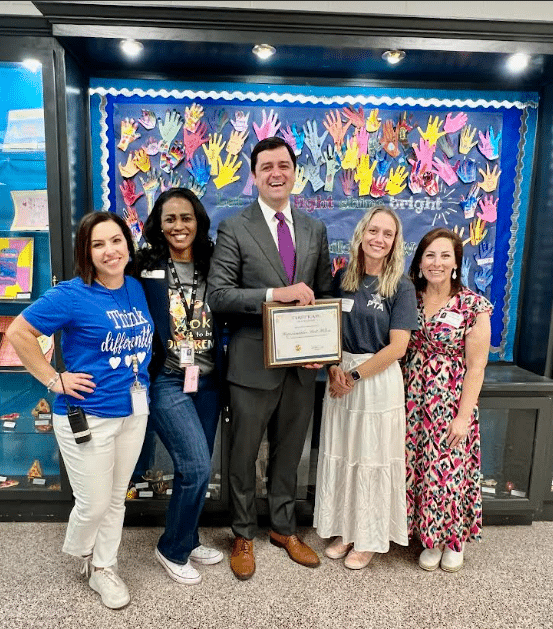
Simpson Elementary School celebrated Exceptional Children’s Week (ECW) last month with five days of special activities to recognize their special needs population and all of their exceptional students.
April 14–18 is set aside each year to celebrate children with disabilities, gifts and talents. This year’s ECW theme was Bridging Gaps and Building Futures, and the school was happy to take part.
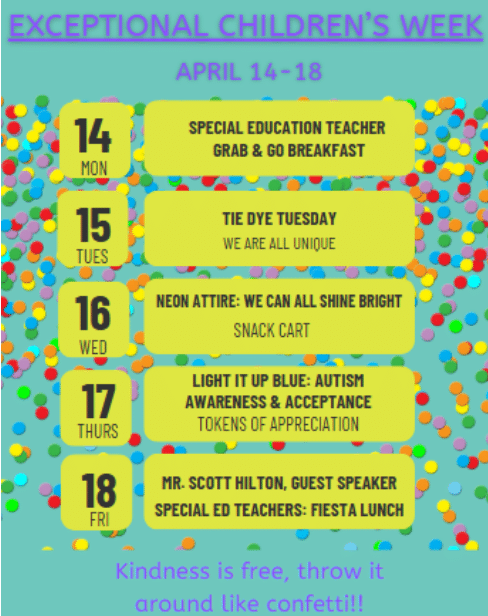
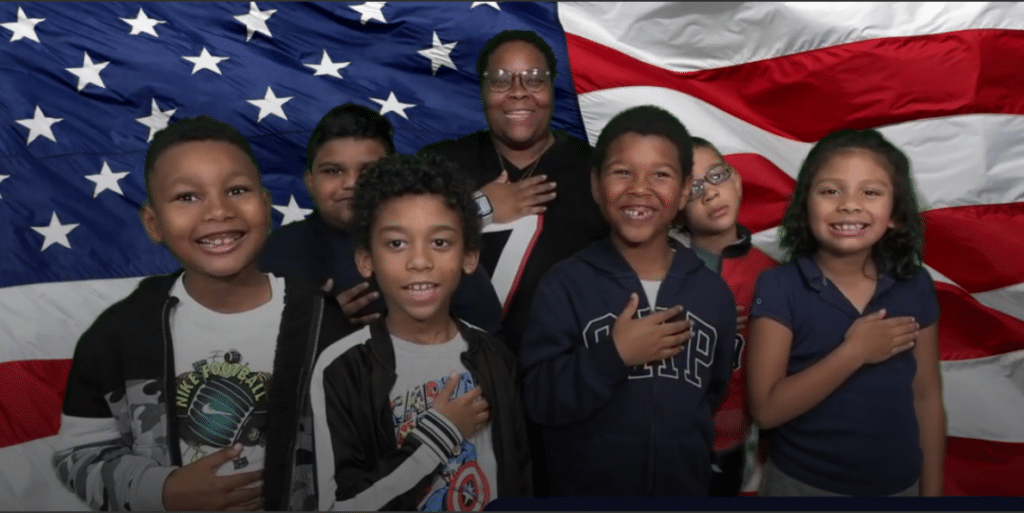
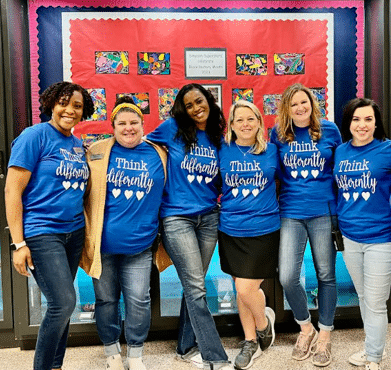
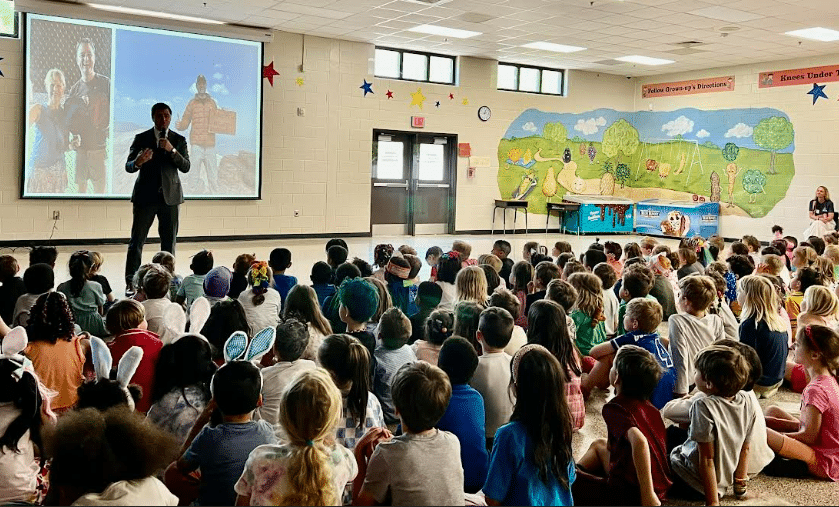
They highlighted each day of the week on the morning news with fun facts about notable people in society — and throughout history — who have overcome challenges with their disabilities, including actor Daniel Radcliffe (who has lived with dyspraxia for his entire life), Tom Cruise, Whoopi Goldberg, Frida Kahlo and Helen Keller.
Simpson Elementary’s technology team also pre-recorded various special needs classes reciting the Pledge of Allegiance every day of the week.
Guest speaker
To end their ECW with a bang, they invited former Simpson Elementary parent, State Representative Scott Hilton, to come in and speak to their K-2 classes about raising his son, Chase (who is autistic and now a student at Norcross High School), and how being different is okay.
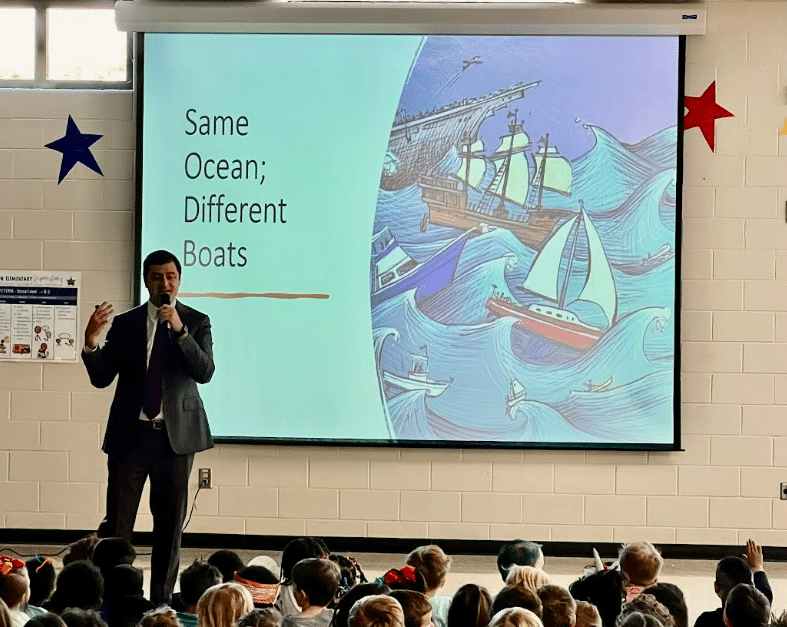
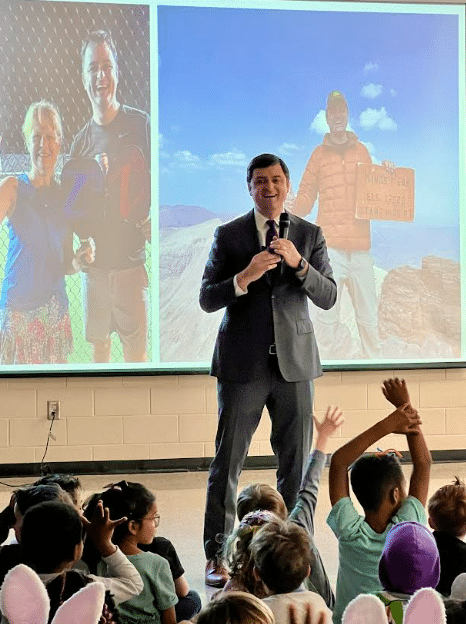
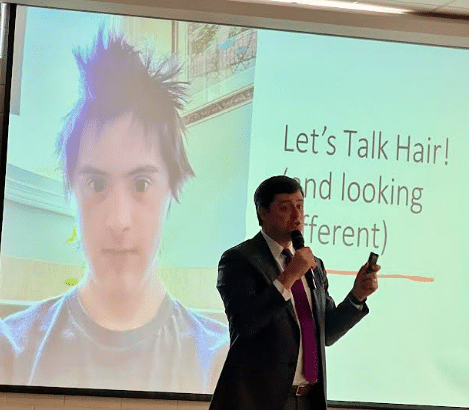
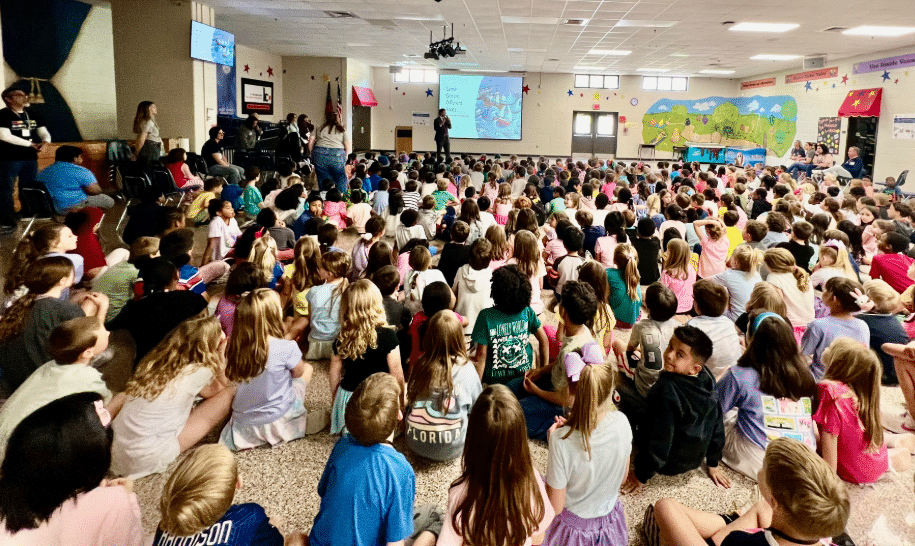
“Showing kindness and being inclusive is the best version of humanity,” said Dr. Taffeta Connery, Simpson Elementary School principal, in a statement about the event.
“Simpson Elementary has a special needs population of 214 (23%) of 946 students. [And] … we strive to ensure that our students are valued, recognized and instilled with high expectations for all.”
For more about Simpson Elementary, visit simpsones.gcpsk12.org.
Related
Education
Paul Duke STEM High School Student Earns CGO Scholarship
Published
7 days agoon
May 2, 2025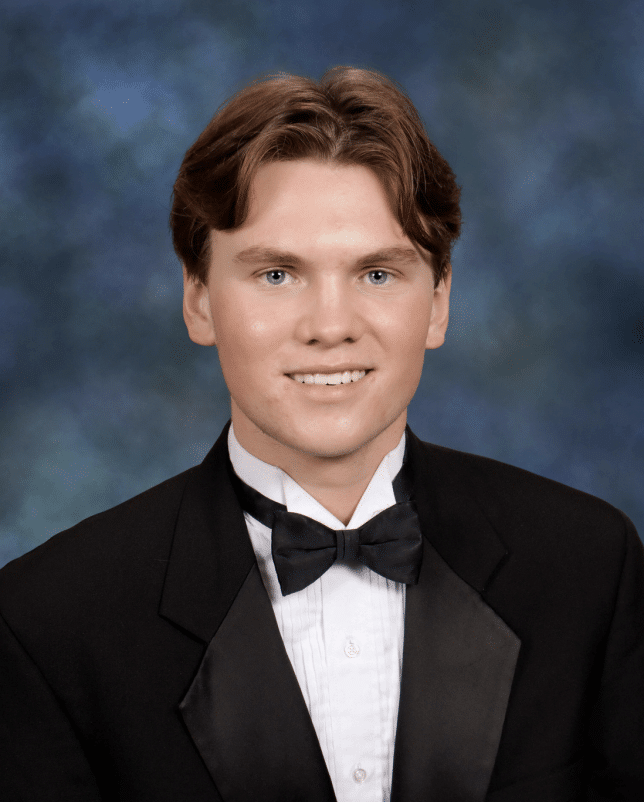
Cobb Global Outreach Inc. (CGO Inc.), a non-profit organization dedicated to enhancing financial literacy and educational opportunities, recently awarded three scholarships to metro Atlanta high school seniors, including one to Paul Duke STEM student, Baylor M. Brown.
The scholarship initiative underscores CGO Inc.’s commitment to empowering youth through financial education and support.
According to CGO’s social media pages, these outstanding students have shown incredible dedication and resilience in their academic journeys. “We are proud to support their continued success and look forward to seeing all that they will achieve!”
Scholarship details and impact
The scholarships provided by CGO Inc. are designed to alleviate financial barriers and encourage academic excellence among students pursuing higher education. Each scholarship recipient will receive financial assistance to support their educational endeavors, along with resources to enhance their understanding of financial management and literacy.
The scholarship recipients have demonstrated remarkable potential and a strong commitment to making a positive impact in their local community and beyond.
Bobby Cobb, CEO and founder of Cobb Global Outreach Inc., expressed enthusiasm about the partnership, stating, “We are honored to support the students … . By investing in their education and financial literacy, we aim to equip them with the skills necessary for a successful and financially secure future.”
Looking ahead
Cobb Global Outreach Inc. remains committed to expanding its scholarship programs and financial literacy initiatives. The organization plans to collaborate with additional schools and community partners to further its mission of closing the wealth gap and fostering economic empowerment among youth.
About Cobb Global Outreach Inc.
Founded in January 2021, Cobb Global Outreach Inc. is dedicated to educating middle and high school students about financial literacy. The organization believes that providing students with tools and resources related to financial literacy will help narrow the wealth gap and promote economic empowerment.
For more information, visit cobbglobaloutreachinc.com.
Related
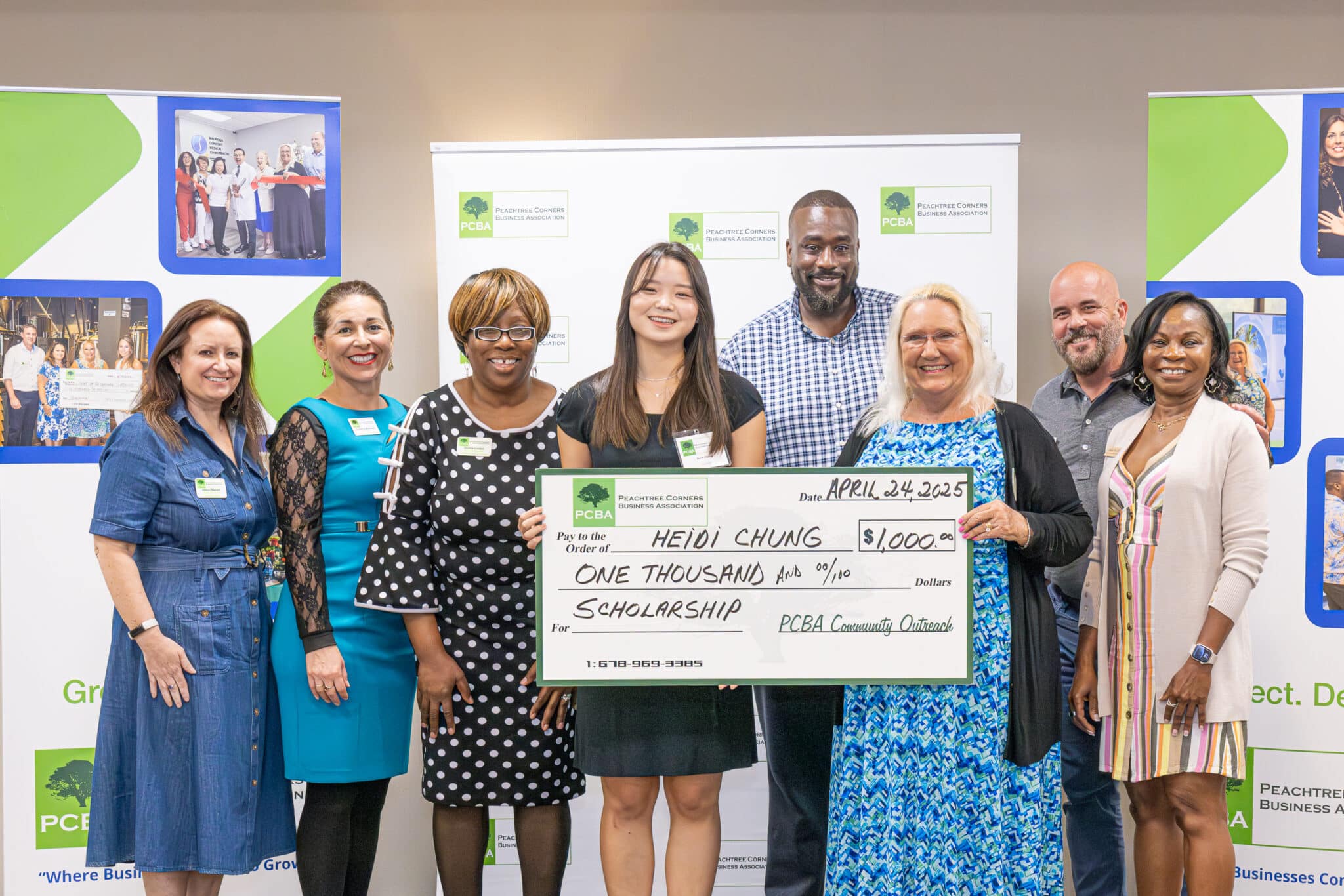
The Peachtree Corners Business Association (PCBA) awarded local high school senior, Heidi Chung, a $1,000 scholarship during their April 24 Business After Hours event. Heidi and her family were presented with the scholarship and introduced to the organization’s members and guests at the monthly gathering.
Heidi was accepted by several colleges and has selected the University of Kentucky to continue her education, pursuing a degree in nursing. When asked what lessons she has learned from her experiences volunteering and serving in the community throughout her life, Heidi commented, “I have learned that true leadership is about service, taking initiative and persevering through challenges.”
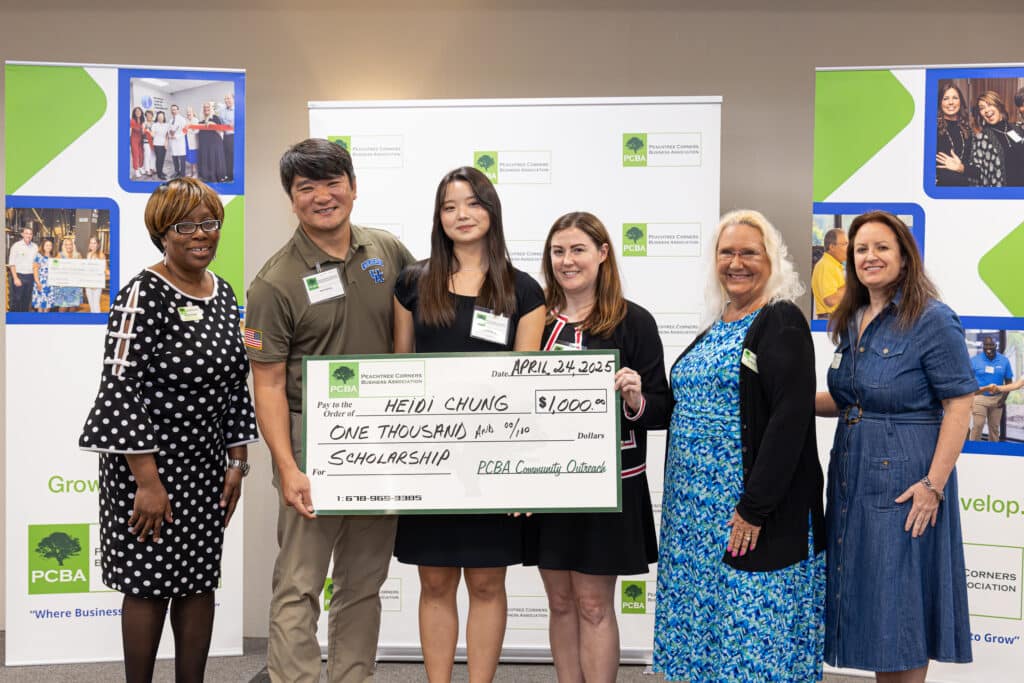
Scholarship Chair Donna Linden and Outreach Director Suzanna Martinez shared that the scholarship committee was impressed with Heidi’s many accomplishments, “whether she was organizing fundraisers, leading performance groups or helping athletes recover from injuries, Heidi demonstrated a positive impact on the community, as well as outstanding academic results.”
Funds for the PCBA Community Outreach Program are raised throughout the year from PCBA membership, sponsorship and an annual charity event. Donations and scholarships are awarded at PCBA’s monthly events so that members have the opportunity to learn more about the individuals and organizations.
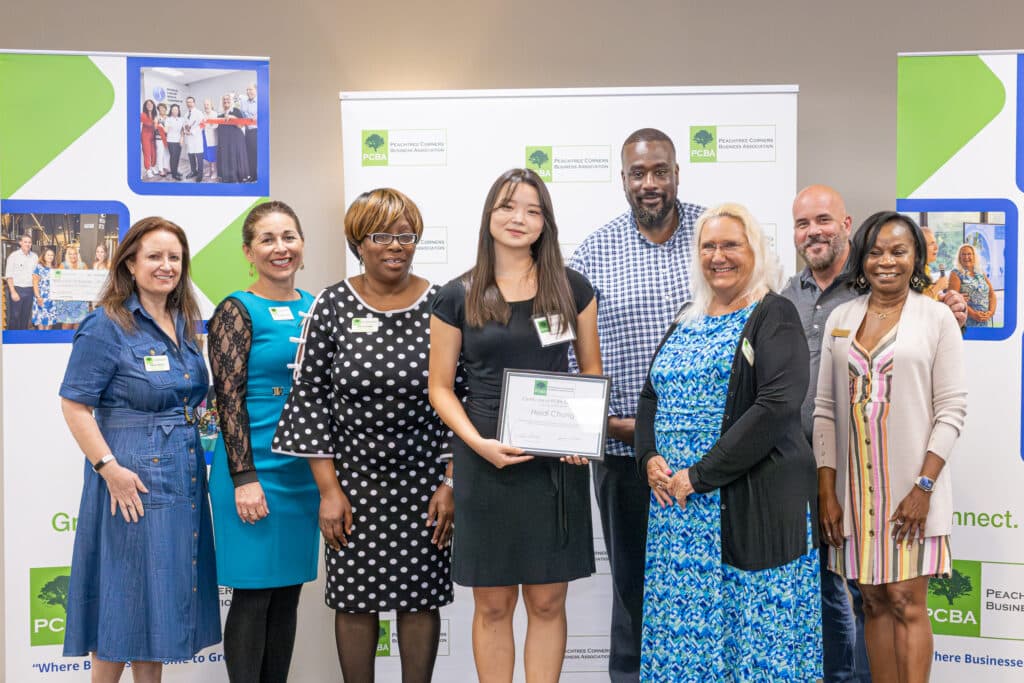
“We are so proud that the PCBA has … awarded 20 scholarships to outstanding future business leaders and donated in excess of $173,000 into our metro Atlanta community over the last 13 years,” stated Lisa Proctor, PCBA board president.
About Peachtree Corners Business Association
“Where Businesses Come to Grow,” the Peachtree Corners Business Association is a business membership organization that focuses on innovative approaches, programs, shared resources, community outreach and opportunities for member businesses and professionals to connect, develop, grow and prosper.
The PCBA is made up of businesses of all sizes and types who want to expand their reach and grow their business within Peachtree Corners and the greater metro Atlanta area.
For more information, call 678-969-3385, email membership@peachtreecornersba.com or visit peachtreecornersba.com.
Related
Read the Digital Edition
Subscribe
Keep Up With Peachtree Corners News
Join our mailing list to receive the latest news and updates from our team.
You have Successfully Subscribed!

GA Tech Launches First-of-its-Kind GT Atrium in Peachtree Corners

Katherine Lafourcade — A Journey of Passion, Resilience and Giving Back

Digital Edition

PCBA Announces 2025 Scholarship Winner

Paul Duke STEM High School Student Earns CGO Scholarship

World Blood Donor Day Starts Here: Theo’s Miracle, Katherine’s Mission [Podcast]

Peachtree Corners Grows Business Opportunities Through Economic Development

Executive Function: A Tribute to Working Moms

Simpson Elementary Marks Exceptional Children’s Week

Executive Function: A Tribute to Working Moms

Official City Merchandise Line Debuts This Saturday at Town Green

Peachtree Corners Grows Business Opportunities Through Economic Development

Digital Edition

World Blood Donor Day Starts Here: Theo’s Miracle, Katherine’s Mission [Podcast]

Paul Duke STEM High School Student Earns CGO Scholarship

PCBA Announces 2025 Scholarship Winner

Light up the Corners [Video]

Capitalist Sage: Business Leadership in Your Community [Podcast]

Cliff Bramble: A Culinary Adventure through Italy

Top 10 Brunch Places in Gwinnett County

A Hunger for Hospitality

THE CORNERS EPISODE 3 – BLAXICAN PART 1

Top 10 Indoor Things To Do This Winter

The ED Hour: What it takes to Remove Barriers from Education

Peachtree Corners Life
Topics and Categories
Trending
-
Digital Edition4 days ago
Digital Edition
-
Podcast4 days ago
World Blood Donor Day Starts Here: Theo’s Miracle, Katherine’s Mission [Podcast]
-
Business3 days ago
Peachtree Corners Grows Business Opportunities Through Economic Development
-
Community2 days ago
Executive Function: A Tribute to Working Moms








